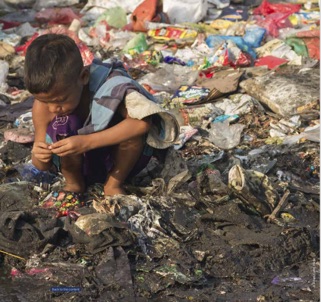News
4 May 2019

The United Nations warn us: we must stop plundering natural resources
To double the gross domestic product since 1970 and get billions of people out of poverty, humankind has adopted a devastating and unsustainable development model that is diametrically opposed to the sustainable development path it has committed to follow according to the Sustainable Development Goals (SDGs). Indeed, to achieve these results, we have more than multiplied by 3 the use of natural resources, are responsible for 90% of biodiversity loss and water stress, exploded the greenhouse gas emissions causing climate change, polluted the environment while exacerbating economic inequality.

This dramatic diagnosis is made by the International Resource Panel working in the framework of the United Nations in its recently released Global Resources Outlook 2019.
In 2017, humankind extracted 92 billion tons from the environment, a volume equivalent to almost 9 million Eiffel Towers in one year! A hair-raising figure… that is yet expected to grow in the future to reach 190 billion tons by 2060, if the current trend continues.
Three more figures illustrate the current trend:
-
•Extraction of fossil fuels was multiplied by 2.5 since 1970 to reach 15 billion tons per year, equivalent to what 30,000 TI Europe, the largest tanker in the world, could transport.
-
•The extraction of biomass increased from 9 to 24 million tons, every year, representing in 2017 around 31 times the global harvest of paddy.
-
•The amount of water used increased from 2,500 to 3,900 cubic kilometers per year, an amount equivalent in 2017 to 40 times the water contained in the Geneva Lake.
This voracity is in part due to the fact that humankind has given priority to improving productivity of labour rather than raising the efficiency of natural resources use.
Food is singled out in the UN report because it is our agriculture and our food that are the prime sources of loss of biodiversity and of water stress. This confirms what has already been repeatedly mentioned on hungerexplained.org.
At the regional level, if we consider impacts measured by inhabitant, North America is world champion for emitting greenhouse gasses, followed closely by Europe, while Latin America is champion for biodiversity loss and Western Asia champion for water stress. Asia and the Pacific and Africa are regions where the impacts per inhabitant are all below world averages.
The report emphasises that there will be a need to implement rather strong, coordinated and urgent measures in order to slow down or reverse the current trend, as it is quite clear that continuing on the same path would lead to disaster.
The Panel believes that “the decoupling of natural resource use and environmental impacts from economic activity and human well-being is an essential element in the transition to a sustainable future”. For this, not only will it be required to increase the efficiency of natural resources uses through technological development, but also to perform an indispensable “move from linear to circular flows through a combination of extended product life cycles, intelligent product design and standardization and reuse, recycling and remanufacturing”.
The measures proposed to achieve such a result remain relatively vague; they include “public research programmes, incentives for private research and development”, as well as support to the piloting of innovative technologies. Regarding incentives, the Panel proposes a generalised carbon tax the revenues of which would be distributed to households and governments “in the form of a uniform global per capita carbon dividend payment”, a subsidy on reafforestation and restoration of native habitats, as well as on bioelectricity with carbon capture and storage and on direct air capture of carbon dioxide. It also suggests the removal of incentives for the production of agrofuels, among others. Lastly, there will be a need, according to the report, to modify food consumption in-depth by reducing consumption of meat and food waste.
The report remains very “cautious” regarding a possible in-depth reform of the global economic system, contrarily to what, for example, FAO indicated in their work on a sustainable future of food that would necessitate, inter alia, competitive, transparent and fair markets, effective social protection schemes and equitable fiscal systems as well as reduced illicit financial flows [read].
Some specialists are skeptical regarding the possibility of operating a decoupling between economic activities and the use of natural resources and production of greenhouse gas emissions in an economic growth scenario. They base their opinion on the analysis of data indicating that whereas a relative decoupling was observed during the 20th century, the situation was reversed in the first part of the 21st century. These analysts think that “green growth is likely to be a misguided objective, and that policymakers need to look toward alternative strategies” [read].
One can seriously believe that, for us to be up to the challenge of sustainability, we need to bring a fundamental change to our economy and to the drivers that define its dynamics. Beyond technological issues to be solved and our readiness to change our individual way of living, the problem will be that one can expect a strong resistance to change from powerful political and economic lobbies who know that their interests are threatened and who will do everything possible to influence our leaders in a way that they will do nothing that will upset their hopes of short-term profits.
Everyone will need to be mobilised, both by modifying their individual behaviour and by exercising their rights and duties as citizens.
—————————————
To know more:
-
•Oberle, B. et al., Global Resources Outlook 2019, Main report with summary, annexes and case studies, United Nations Environment Programme, 2019.
-
•Hickel, J., and G. Kallis, Is Green Growth Possible? New Political Economy, 2019.
-
•Bellù, L.G., et al.,The future of food and agriculture - Alternative pathways to 2050, FAO 2018.
Selection of recent articles on hungerexplained.org related to the topic:
Last update: May 2019
For your comments and reactions: hungerexpl@gmail.com




